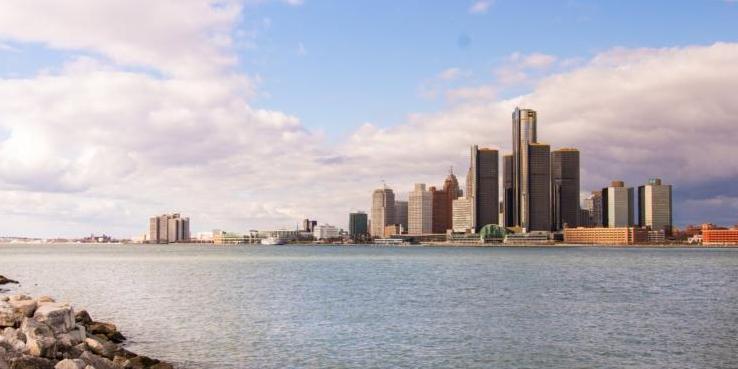Share, Learn, Create Innovative Economic Development Ideas!
A
diverse and dynamic network that develops and implements innovative
economic development ideas, tools, models, policies, and practices for
Michigan.
|
|
|
|
|
|
2018 Project Announcements
|
|
REI funds several types of projects: Co-Learning Projects, which are researched and written by professionals; Co-Implementation Plans, which are led by Innovation Fellows; and Student-Led, Faculty-Guided Technical Assistance projects, which are researched and written by student teams at Michigan universities and colleges. Visit the Completed Projects page for examples of these types of work and visit the Submit an Application page for timelines and to apply for funding.
|
 |
Strengthening
Michigan's Infrastructure and Sustainability: Effective Implementation
of Master Plans and Capital Improvement Plans
John Austin, Director & Dayne Walling, Senior Policy Adviser, Michigan Economic Center
This plan
will examine Michigan's municipal master plans and Capital Improvement
Plans in the context of the challenges with public infrastructure
systems and the opportunities for a future blue and green economy.
Statewide information will be assessed and ten municipal profiles
developed and compared representing a range of counties, cities,
townships, and villages based on population size, economic
characteristics, and geographic location, including the core communities
of Benton Harbor, Detroit, Flint and Grand Rapids. Legislative, policy
and strategic management reforms will be recommended to overcome
impediments and to optimize public infrastructure systems in enhancing
economic growth, protecting health, and increasing sustainability.
Creating a Fashion Entrepreneurship Community
Meleena Herring & Joe Carr, The Runway
Fashion, textile and design are ubiquitous and Michigan communities who
capture
the interest and energy of entrepreneurs in this industry can create,
attract and retain talent while producing new companies and jobs. This
plan will outline the analysis and design necessary to create a
successful fashion entrepreneur ecosystem in a community.
A Study of the Economic Impact of Startup Accelerator Programs in Michigan
Tony Willis, Lansing Economic Area Partnership
The most
common way to define a Startup Accelerator is a fixed-term, cohort based
program, that includes outlined objectives for the participants,
industry expertise (mentorship), educational components, an exchange of
funding for equity, and culminating in a "Demo Day." With the successful
increase in accelerator programs, many communities, universities, and
other entrepreneurial support organizations across the nation have
decided to either create or replicate accelerator models in their own
communities with hopes of having similar success. Despite the upsurge in
visibility and glamorization of the startup lifestyle coupled with the
successes of notable startups who were alumni of named accelerators,
there is no study which illustrates the actual economic impact a startup
accelerator has on its local region.
Smart Cities and Transportation in Michigan
Dong Zhao, Ph.D., School of Planning, Design and Construction, Michigan State University
Smart
cities represent the future of urban and infrastructure development.
This project aims to provide a holistic picture of the past, current,
and trends of smart cities while retaining a focus on the state of
Michigan. This project will focus on the electric-vehicle (EV) charging
infrastructure to support a smart city using a Detroit-based case study.
A mixed-methods approach will be used including survey, statistical
analysis, and computer-based simulation. The outcomes will provide
quantifiable evidence about smart cities and infrastructure development
to Michigan leaders and provide policy implications for the Michigan
automobile industry.
|
 |
Network and Digital Media Strategies for Mobilization toward Policy Change
Laleah Fernandez, The Quello Center, Michigan State University
This
project will focus on a digital media strategy for The Southwest
Michigan Planning Commission (SWMPC) to improve awareness, consensus
building and action, related to current topics of policy importance for
economic development. In particular, this project will include a network
analysis to help optimize the flow of information (e.g. remove
redundancy), specify influencers/opinion leaders, and improve
communication efficiency based on strength of ties and attributes among
stakeholders. The project will result in a case study research paper and
digital media outreach template for other regional economic development
organizations.
Exploring the Underground Economy in Detroit
Rita Fields, Ph.D., Business College, Madonna University
Economic
development initiatives targeting entrepreneurs have found Detroit to be
a ripe breeding ground for talent, and for those entrepreneurs who are
able to participate in those programs this has been a time of great
fortune. The reality, though, is that these programs are not open to all
who desire to ascend to the entrepreneurial ranks. For a multitude of
reasons that need to be further identified and explored, some aren't
able to take advantage of this opportunity. For some entrepreneurs,
transitioning from being 'off the books' (or, as referred to in the
title, underground) to 'on the books' would result in a significant pay
cut due to the costs of conducting business. The research proposed in
this study will focus on the definition of the underground economy,
identification of susceptible participants, barriers of entry that have
prevented participants of the underground economy from engaging in
standardized entrepreneurial development, an attempt to quantify the
potential economic impact of the underground economy in the region and
why a commitment to reconnect that effort to the overall impact benefits
the region and propose recommendations on how funders can be more
inclusive in their funding guidelines.
|
 |
Student-Led Faculty-Guided Projects
|
MSU School of Planning Design and Construction
City of Durand Downtown Economic Development Enhancement Strategy
The City of
Durand is seeking to update its 2004 Downtown Economic Enhancement
Strategy. Home to roughly 3,400 residents, the City hosts a population
that is 64% low to moderate income (LMI). The community has made great
strides to improve and beautify the downtown district but still
struggles to attract and retain viable local businesses. The goal of
updating this plan is to develop a comprehensive strategy for
attracting, retaining, and growing local businesses in the historic
downtown. It will include performing basic market research, implementing
a community wide survey, and incorporating new data into the existing
plan parameters to identify recommendations and implementation
strategies. For example, identifying business development strategies
that target high demand commercial uses.
Village of Sebewaing Sea Kayaking and Recreation Study
The Village
of Sebewaing is in the beginning stages of the first Master Plan in over
thirty years. To include the Village's wonderful yet underutilized
natural resources, this plan will take into account factors unique to
Sebewaing. Due to budget constraints, this fiscally distressed
community is seeking the help of the MSU Urban and Regional Planning
Practicum Program, to incorporate a kayak presence and walking path into
attainable goals within the Village of Sebewaing Master Plan. Students
will help evaluate current kayak and walking trends, analyze data for
feasibility, identify the best potential site(s), and formulate
strategies for implementation to create a more navigable community for
residents and visitors alike. This has the potential to spur future
revitalization and economic growth for downtown Sebewaing and
surrounding areas.
Assessment of the Maker Economy in Detroit
Student Team, Wayne State University, Led by Professor Robin Boyle
For many
commentating on national trends, the 'maker economy' is a network of
inventors, artisans and entrepreneurs dedicated to designing and making,
and being committed to the places where they live. The maker economy
has been encouraged by and employs new technologies and systems that
enable individuals or small businesses to design, make and merchandise
products and services that were only available to larger business
entities. The proposal as outlined below builds off a metropolitan-wide
study of the emerging maker economy conducted in UP 6550 - Introduction
to Local Economic Development, an elective course in the WSU Master of
Urban Planning program. This work, completed by 20 graduate students
(under the guidance of Professor Robin Boyle) in the winter semester
(Jan-April) 2017 addressed whether a 'maker economy has developed in
Southeast Michigan, particularly Detroit, who are the "maker"
enterprises, what support systems ("enablers") exit to assist emerging
or growing firms identified in the maker economy and what are the
perceived gaps in the services; supports provided by the enabler;
support organizations?
 Big-Box Converted to Co-op
Student Team, Alma College, Led by Edward C. Lorenz
An Alma
College student team plans to work with the local community to convert
an abandoned 'big-box' retail location (K-Mart) to a year round fresh
vegetable and fruit production facility. Launching a cooperative
controlled by local consumers and workers will benefit both urban and
rural poor in the region.
|
|
|
|